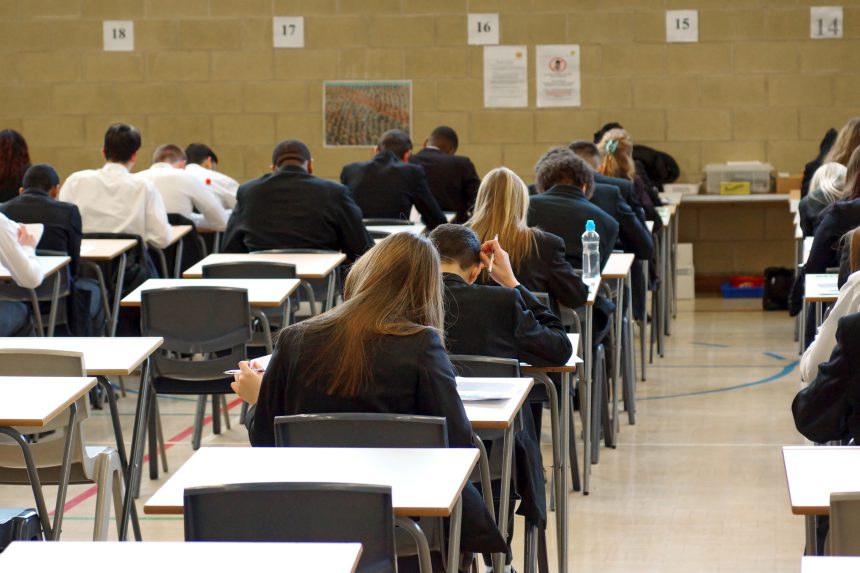Contents:
Qualification Level: Level 2
Age Group: 14-16 years
Cost: Free in state schools
Skills Developed: Academic skills and critical thinking
Learning Environment: Classroom-based
In England, Wales, and Northern Ireland, pupils between the ages of 14 and 16 study for GCSEs as part of the National Curriculum (a list of things that all students should be taught). Subjects like maths, english language, and science are compulsory, but you’ll have the freedom to choose to study other subjects you’re interested in. You’ll generally pick these subjects at the end of Year 9.
What are GCSEs?
GCSE stands for General Certificate of Secondary Education. GCSEs are the most common academic qualifications taken by students at age 14.
They usually take two years to complete and culminate in ‘public exams’ at the end of Year 11 when students are 16 years old. GCSE students across the country sit the same exam papers, which are marked by external examiners (i.e. not your teachers).
Some GCSEs also include coursework. Coursework typically takes the form of an extended essay or project. It is managed by your school and completed during the academic year.
The things you’ll be expected to know for each of your GCSEs (known as the specification) may vary slightly across exam boards. Your school will decide which exam boards they use for each GCSE.

What are IGCSEs?
IGCSE stands for International General Certificate of Secondary Education. IGCSEs are internationally recognised qualifications taken by students at the end of their secondary school education, though some students might take them earlier or later.
IGCSEs are equivalent to GCSEs. They are administered by various exam boards and are designed to be accessible to students worldwide. In the UK, you might take IGCSEs if you study at an international or private school.
IGCSEs are available in a wide range of disciplines including languages, humanities, sciences, mathematics, and creative arts.
What is the difference between GCSEs and IGCSEs?
Traditionally, the key difference between GCSE and IGCSE qualifications was the format of assessment. GCSEs included more coursework, whilst IGCSEs relied mainly on final exams. However, the UK government has recently revamped GCSEs, significantly reducing coursework. Now, many GCSE subjects primarily rely on final exams to determine grades.
Today, the differences between GCSEs and IGCSEs are minor, and both are accepted as ‘equivalent’ qualifications by the majority of universities and workplaces around the world.

Choosing your GCSEs
Choosing your GCSE subjects can feel overwhelming. You may think that your whole future hangs on this choice! However, it’s important to remember that once you start post-16 education, such as A Levels, the subjects you chose for GCSE typically hold less significance.
Most universities and places of work just want to see that you have GCSEs in maths and english. The only exception is if you are applying for a course or job that requires specialist knowledge or skills. Additionally, if, for example, you want to study History at A Level, some sixth forms or colleges may require you to take this at GCSE.
It’s your responsibility to check the requirements for any course or career you want to pursue.
What are STEM GCSEs?
STEM GCSEs are crucial for developing skills that are in high demand in various industries and provide a strong foundation for further study in STEM fields. The following STEM subjects are typically available at GCSE level:
- Science: Students study combined science (also known as double science) or triple science (known as single science). Combined science awards two GCSEs and covers all three disciplines broadly, while triple science allows students to take each subject individually, resulting in three GCSEs.
- Maths: A compulsory subject for all students, GCSE Maths develops problem-solving, analytical, and quantitative reasoning skills. Some students may also take further maths as an additional GCSE.
- Design and technology: DT is a popular STEM-related GCSE subject. It encourages creativity, innovation, and technical skills, with a focus on design principles and real-world applications.
- Computer science: Students are introduced to programming, algorithms, and computational thinking, providing essential skills for careers in technology and engineering.

GCSEs are an important part of secondary education, offering you the opportunity to study a wide range of subjects and develop essential academic skills. While the process of choosing your GCSE subjects can feel overwhelming, it’s important to remember that flexibility exists in post-16 education, and most universities or employers focus on your overall performance at GCSE, particularly in the core subjects.
FAQs
Should I take combined science or triple science at GCSE?
Combined science provides a broad overview of the sciences. It combines elements of biology, chemistry, and physics into a double award, resulting in two GCSEs. Combined science is suited for students who have a general interest in science but do not want to specialise in one specific science subject.
In comparison, triple science covers biology, chemistry, and physics as separate subjects, leading to three individual GCSEs. It offers a deeper and more specialised understanding of each scientific discipline and is recommended for students with a strong interest in and aptitude for science.
Choosing combined science should not limit your post-16 options. Sixth forms and colleges do not usually require you to have GCSEs in each separate science to study a science A Level. However, taking combined science may mean you miss important concepts that you’ll need to catch up on later.
Equally, taking combined science might afford you the time to study other STEM disciplines, like design and technology.
Should I take more than the recommended number of GCSEs?
You may have the option to take ‘additional’ GCSE subjects, such as Further Maths or Statistics.
Taking an extra GCSE is a great opportunity to study another subject you’re interested in. It will also demonstrate your organisation and time-management skills to prospective universities and employers.
However, taking an extra GCSE isn’t required, nor expected of you, and you don’t want to spread yourself too thin. It’s better to achieve higher grades in 9 GCSEs, than lower grades in 11. Moreover, you might decide that doing extracurricular activities or having more free time is more important to you.
My school doesn’t offer the course I want to take. What should I do?
If your school doesn’t offer a qualification you want to take, talk to your school to discuss your options. They may have specially-trained guidance counsellors or career advisors who can help you explore alternative pathways, such as opportunities at nearby schools or colleges.
Remember that colleges and universities understand that many students don’t have access to more niche GCSE courses, such as psychology or business, and as such, don’t require them for entry.

Comments